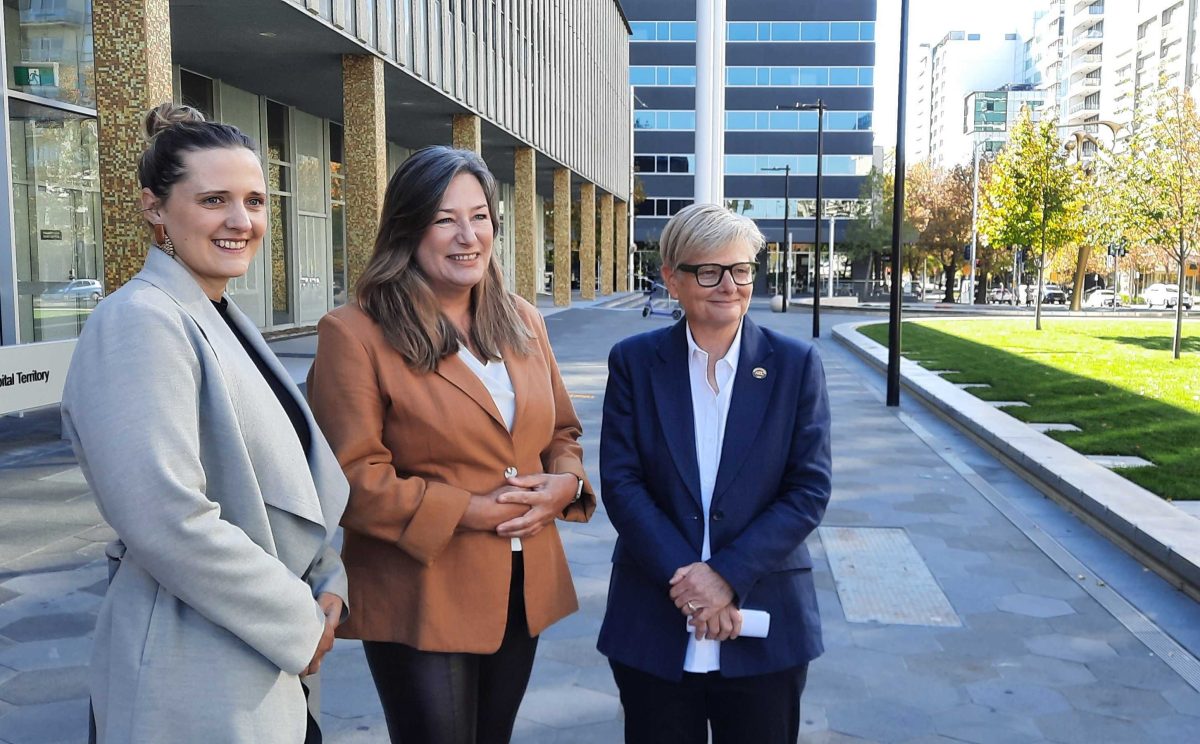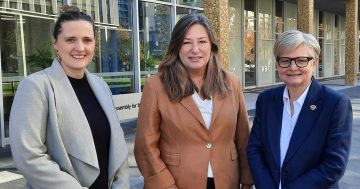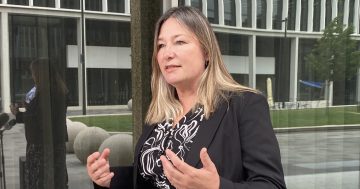
ACT Council of P&C Associations president Liane Joubert, Education Minister Yvette Berry and AEU ACT president Angela Burroughs at the Legislative Assembly. ACT public schools face a fundamental shift in coming years. Photo: Ian Bushnell.
The teachers union has called it a game changer and parents finally feel heard.
The Final Report of the Literacy and Numeracy Education Expert Panel has been universally welcomed. Education Minister Yvette Berry accepted all eight recommendations in principle and promised funding for their implementation over four years from the start of term in 2025.
The panel has recommended a greater focus on explicit instruction, especially in the early years, more testing to prevent students being left behind and greater consistency across all ACT public schools.
Ms Berry said a fuller government response would come in June but the directorate would start planning with school leaders for a shift from the current autonomous setup to a centralised system delivering a consistent curriculum approach across the ACT.
She said families would start to see some changes in the classroom from day one. But some schools were already adopting the panel’s recommendations and these would be models for others more in need of change.
She rejected suggestions the government could have acted sooner given concerns about sliding ACT public school performance going back more than decade.
Ms Berry said she had always followed the expert advice and that had shifted in recent years.
Australian Education Union ACT branch president Angela Burroughs said teachers would embrace the panel’s findings, particularly the recommendation for the centralised development of curriculum materials and programs.
Ms Burroughs said this would relieve teachers of unnecessary work that was contributing to burnout and give them back their weekends.
“It will radically change the enjoyment of teaching by freeing up teachers to do what they do best, which is to adapt materials to suit their kids and to make sure they’re providing excellent learning experiences that the students find engaging,” she said.
Ms Burroughs said the recommendations about explicit instruction would be of no surprise to teachers, some of whom deployed it more than others, but they would provide a tighter framework for them.
“What this does do is provide more boundaries in terms of what a learning sequence will look like,” she said. “And the thing I’m really excited about in this report is the commitment to provide sample scope and sequence documents for our teachers and sample units of work.”
But Ms Burroughs said teachers would need support through the implementation stage, and the staffing issue also needed to be addressed.
“The key to this is providing the centralised support for those teachers who need to change their practice and it’s not going to be everyone,” she said.
ACT Council of Parents & Citizens Associations president Liane Joubert said better late than never was not a term she would use but the council was excited that the struggle of parents and students to be seen and heard had borne fruit.
Ms Joubert said the implementation of the panel’s recommendations would make a real difference for families.
“Some of the parents in the ACT have told us how their children have really struggled to learn to read and they’ve had to make use of other supports such as tutors to learn this foundational skill,” she said.
“We’re hopeful that with the implementation of the recommendations, this will no longer be needed.”
Ms Joubert said parents had told the council that they wanted one educational system instead of 91 individual schools across the ACT.
“Parents would like to be able to send their children to the local public schools without feeling like they’ve either won or lost their postcode lottery,” she said.
“Consistent assessment is also welcomed and we’re hopeful those students who are currently struggling will be able to be identified and some targeted support provided, and no student left behind throughout the implementation of the recommendations.”
The University of Canberra (UC), where many of the Territory’s teachers are trained, also backed the panel’s recommendations.
Deputy Vice-Chancellor Academic, Professor Michelle Lincoln, welcomed the focus on the use of evidence-based teaching practices, saying these findings aligned with UC’s Initial Teacher Education (ITE) programs.
“Our units on teaching approaches around literacy and numeracy, and the use of multi-tiered support, are strongly backed by evidence. Our graduates will be well placed to put the recommendations of the report into practice,” she said.



















